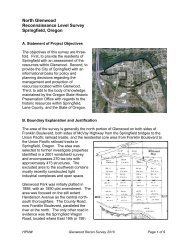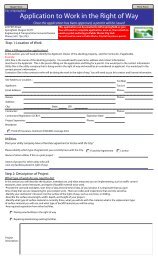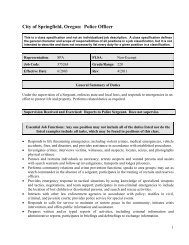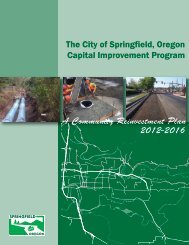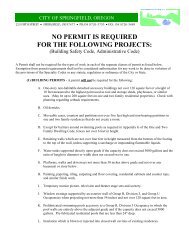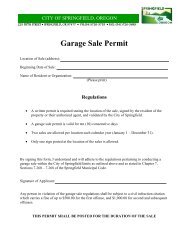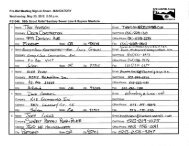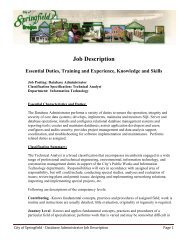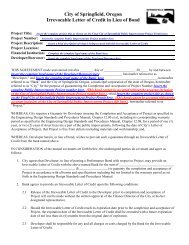Fact Sheet
Fact Sheet
Fact Sheet
- No tags were found...
Create successful ePaper yourself
Turn your PDF publications into a flip-book with our unique Google optimized e-Paper software.
Lawn & Garden Maintenance<br />
Lawn & Garden<br />
Lawn & Garden<br />
At A Glance<br />
Lawn &<br />
Garden<br />
There are just a couple of easy tips you can follow in your lawn and garden care that<br />
will help prevent water pollution. Fertilizers, pesticides and other chemicals left on yards or<br />
driveways are easily washed or blown into storm drains that flow to our rivers and streams.<br />
Once in the river, chemicals that make your yard beautiful have an ugly effect on<br />
wildlife and water quality. Consider the following tips for a healthy yard, healthy<br />
river, and in many cases a healthy wallet!<br />
General Landscaping Tips<br />
Store fertilizers and other chemicals under cover to protect them from rain & wind.<br />
Plant slopes with dense ground covering plants to prevent erosion.<br />
Go Native! Plant native vegetation to reduce the amount of water, fertilizers, and<br />
pesticides applied to the landscape. Visit www.ci.springfield.or.us/ESD for more<br />
information.<br />
NEVER apply fertilizers or pesticides when rain is predicted within the next 48 hours.<br />
Use a grass seed mix that is for the Pacific Northwest. These grass mixes are well suited for the soil types<br />
and climate of our area.<br />
Mow your lawn high -- aim for 3 inches. This promotes healthier roots and a healthier lawn. A higher lawn<br />
needs less fertilizer and tolerates hot, dry conditions better.<br />
Healthy Lawns.<br />
Healthy Rivers.<br />
CITY OF SPRINGFIELD<br />
STORMWATER MANAGEMENT<br />
The River Begins at Your Front Door<br />
Water Pollution Problem Reporting Hotline<br />
telephone: (541) 726-3694<br />
online at: www.ci.springfield.or.us/ESD/complaints
Lawn & Garden Maintenance (continued)<br />
Do not overwater and don’t use a watering schedule. Water only when grass or plants show signs of needing<br />
it. Overwatering increases the risk of washing chemicals into nearby storm drains.<br />
Don’t rake or blow leaves, clippings or pruning waste into the street where it can be washed down a<br />
storm drain. Not only is this bad for water quality, it can cause street flooding when storm drains<br />
become clogged.<br />
Use slow-release fertilizers to minimize the amount of chemical that is washed<br />
away by rain, and look for organic products.<br />
Read labels carefully and follow all instructions. Do not over-apply<br />
pesticides and fertilizers. Apply to spots as needed, rather than<br />
blanketing an entire area.<br />
Grass clipping and mulched leaves are an ideal food source for your lawn,<br />
consider using a mulching lawn mower and not raking clippings up.<br />
Attention Water-Front Residents<br />
Being on the water’s edge, your actions have an even greater effect on the health of local streams and<br />
rivers. You can take additional steps to protect our waterways.<br />
Plant a buffer strip of native plants between the water and your yard. This protects against<br />
erosion and filters out pollutants.<br />
NEVER burn yard waste along the shoreline -- ashes contain phosphorus, which can be very harmful<br />
to water quality.<br />
Do not feed wildlife along the shores; it increases the amount of animal waste in the water.<br />
www.ci.springfield.or.us/ESD/TipsforHome<br />
www.healthylawns.org<br />
www.epa.gov/oppfead1/Publications/lawncare.pdf<br />
www.bhg.com/bhg/gardening<br />
Additional Resources<br />
There are a number of great books on gardening with native plants in teh Pacific Northwest. Check out your<br />
public library or favorite bookstore to find one that suits your style!<br />
Be a clean water hero.<br />
Protect our waterways.




